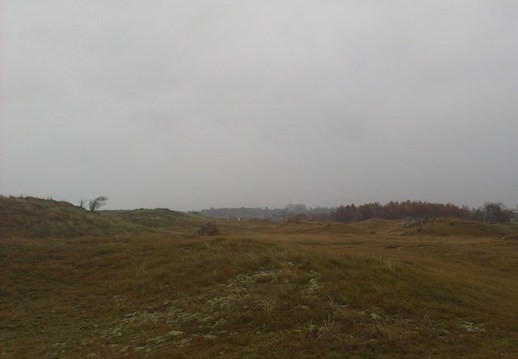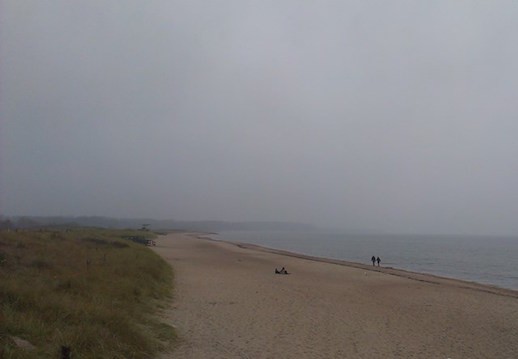Shadows and Reflections: the annual collection of postings where Caught by the River’s contributors and friends take a look back on the events that have shaped the past twelve months. Today it’s the turn of Paul Scraton.
At Hamburg station on a chilly Thursday in November, hundreds of people were waiting. They were gathered on the platform, waiting for the Copenhagen train. They were gathered in the concourse, waiting for information about train tickets or where they should head to next. Young people in high visibility jackets attempted to make sense of the chaos, for themselves and the people they were helping. A makeshift desk had been built at the top of the stairs, with signs in Arabic, English and French. Families sat on the floor surrounded by bags. Young men flicked through the screens on their phones. The commuters and travellers of Hamburg moved through the scene, occupying the same physical space and yet somehow apart. It was not so much two worlds colliding, but an awkward dance between them, with no touching.
When the train for Copenhagen arrived security guards checked tickets at the doors. I was heading to Oldenburg in Holstein, the second to last stop before the ferry to Denmark. Most of my fellow travellers, those who were nearing the end of an arduous journey from Syria, from Iraq, were aiming further north. Denmark, perhaps. Or across the bridge to Sweden. My destination was a music festival in a 1970s holiday camp on the Baltic coast, and the carriage was filled with rock fans and refugees. Northern Germany, in the early winter of 2015.
I sat down opposite a father and his daughter. He could speak English and she could read, so between them they worked out from the tickets and the electronic displays above the seats where they should be sitting. I shared the train with them for about an hour, talking about where they had come from in Iraq and where they were going to in Sweden. There were many questions I wanted to ask but only a few that I felt able to come out with. Instead we spoke about the countryside outside the window, about school and my daughter, who was about the same age as the girl sitting opposite me, eating Chinese noodles from a takeaway box.
At Oldenburg I said goodbye and climbed down onto the platform. A bus took us the seven kilometres through the town and past neat fields towards the sea and the holiday camp. Along the way I noticed a number of people walking in groups between the town and a red-brick complex within sight of the camp and the within earshot of the Alabama Shakes when they took to the stage the following evening. It was a German army barracks, now turned into emergency accommodation for refugees. A thousand were sleeping there during the weekend of the festival, with plans to welcome another five hundred more.
In the daytime at the festival, before the bands took to the stage, I went for runs and walks along the path that followed the top of dyke between the dunes and the beach. Beyond the sands under November skies the Baltic looked gloomy and melancholy. When my friend arrived the next day we walked down to the pier and looked out across the water. I had him imagine the skeletons of boats on the seabed that would be visible should the waters retreat. Not far from here concentration camp survivors died in the water when the RAF attacked the Cap Arcona, what they thought to be a troop ship, only a few days before the war ended. We also spoke of the refugees, those in Hamburg and at the barracks and those seventy years ago, around the time of that bombing raid, when millions arrived in the soon-to-be-divided Germany, forced west from their homelands in East Prussia and Pomerania by the advancing Red Army.
One of those millions was Günter Grass, winner of the Nobel Prize for Literature, controversial conscience of a nation in the second half of the 20th century, and son of the Baltic. He grew up in Danzig – now Gdansk – and would live near the end of his life in a village by Lübeck. When I visited that city earlier this year, Grass was still alive. I walked through the museum dedicated to him, where they did not shy away from the controversy surrounding his membership of the SS in those last months of war, and which he kept quiet for over fifty years. And there I purchased one of his later novels – Crabwalk – which I read between walks exploring Lübeck and the nearby Baltic coast, searching for stories.
Crabwalk tells the story of the sinking of the Wilhelm Gustloff, a former Strength through Joy cruise ship that by the end of the war was transporting refugees from the German territories in the east. On the 30th January 1945, twelve years to the day after Hitler’s ascent to power, the boat was sunk by a Soviet torpedo. It would become one of the world’s worst maritime disasters, with over 9000 people killed including 5000 children. But it was a story lost among the many horrors of war and the Holocaust, and like the bombing of Dresden it was difficult for many to feel much sympathy with the German refugees fleeing from a war and the redrawing of Europe’s borders that, unsympathetic voices would argue, was very much of their own making.
This taboo was broken by Grass in his novel, and in it he explores how the subject of German suffering had, by being ignored by mainstream history whether inside or outside of Germany, had been surrendered to the right-wing. There is a reason why neo-Nazis gather in Dresden on the anniversary of the bombing. There is a reason why the sinking of the Wilhelm Gustloff became a nationalist rallying point. And through the book, it is clear that there are dangers for society in the maintenance of the taboo, in the continued silence. The day after I had visited Grass’s museum in Lübeck I walked through the resort of Travemünde to look out over the Baltic again. I thought of those two boats – the Cap Arcona and the Wilhelm Gustoff – the concentration camp survivors and the refugees in the East, taken by the sea but not because of the sea.
A few months after my visit to Lübeck and I read the news that Günter Grass had died. Although I had never been the greatest fan of his books, Crabwalk was haunting me. I revisited some of his essays, his interviews, recognising again how often his public pronouncements struck a chord. In the summer following his death Germany became consumed by what the media term the “refugee crisis”. In some places refugee shelters and housing were attacked; other communities opened their doors and volunteered their time and resources to help those fleeing from the wars in Syria, Iraq, Afghanistan… In Berlin the numbers overwhelmed the authorities. If it wasn’t for young people in high visibility jackets, giving up their time and their skills, it was said, the whole thing would collapse.
But until I passed through Hamburg station in November the situation was abstract, events on the nightly news, even if the location for the pictures were just a few kilometres away in my own city. And then, a week or so after I returned from the festival, the gymnasium of the college across the street from our house was designated as an emergency shelter. Many sports halls and other public buildings, including the iconic Tempelhof Airport, have been loaded up with camp beds and other basic supplies. Outside the entrance to the gymnasium across the street a number of portaloos were delivered, the numbers of people inside too great for the changing facilities of the sports hall to deal with. I looked online to find out what help can be given but beyond material goods – sleeping bags, jackets, other clothes – such as those we donated to a collection at our daughter’s school, it was not clear how to help. And I feel guilty for not simply crossing the street to go and ask.
The winter draws near. As I write this the German Parliament have just voted in favour of military support for actions in Syria. War and displacement are nothing new. They happened along the Baltic coast at the end of the Second World War and across Europe in the centuries before and in the decades since. I walk past the row of portaloos on my way to the U-Bahn station, where two security guards outside the gymnasium and a sign on the fence tells the college students to use a different entrance. I think about how quickly such things can seem normal. I think of a thousand people at a festival and a thousand people sleeping in army barracks, and the beauty of the dunes and coastline that linked us. I think of the Iraqi man and his daughter, and I hope they made it to Sweden. And I think of Günter Grass, and cannot help wonder what he would have had to say about it all.
Paul Scraton is the Editor in Chief of Elsewhere: A Jouranl of Place

